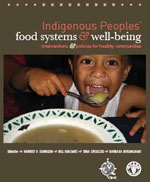Publications
A series of documents relevant to Indigenous Peoples are shown below. These include the FAO Policy on Indigenous Peoples together with a series of Voluntary Guidelines and Principles approved by FAO Member Nations which apply to Indigenous Peoples.
Using the search box located at the right side of the page, there can be found a series of useful documents with information on collaboration between FAO and Indigenous Peoples. The list includes publications, papers and reports that can assist in identifying and engaging with Indigenous Peoples, facilitate multi-stakeholder dialogues and strengthen cooperation.
Schinziophyton Rautanenii, known as Mungomu in Macossa, is a tree that produces a nut best known as one of the staples of the diet of the Kung Khoi-San tribe in the Kalahari Desert. The nut, known in English as the...
Based on a survey of census and household data across the region, this report finds that there are structural conditions that might anchor indigenous peoples to poverty and preclude their full potential for economic opportunity. These conditions are an
important focus of the World...
Indigenous Peoples in cultural homelands of the most rural areas of developing regions experience challenges in using their traditional food systems and to ensure food security and health despite the treasures of food biodiversity that could support well-being. This...
Food systems of Indigenous Peoples who retain connection to long-evolved cultures and patterns of living in local ecosystems present a treasure of knowledge that contributes to well-being and health, and can benefit all humankind. This book seeks to define and...
FAO and other UN agencies recognize that communication is fundamental to promote sustainable development. Within this framework, Communication for Development (ComDev), a participatory communication approach that combines a variety of processes and tools ranging from rural radio to Information and...

.bmp)



.bmp)